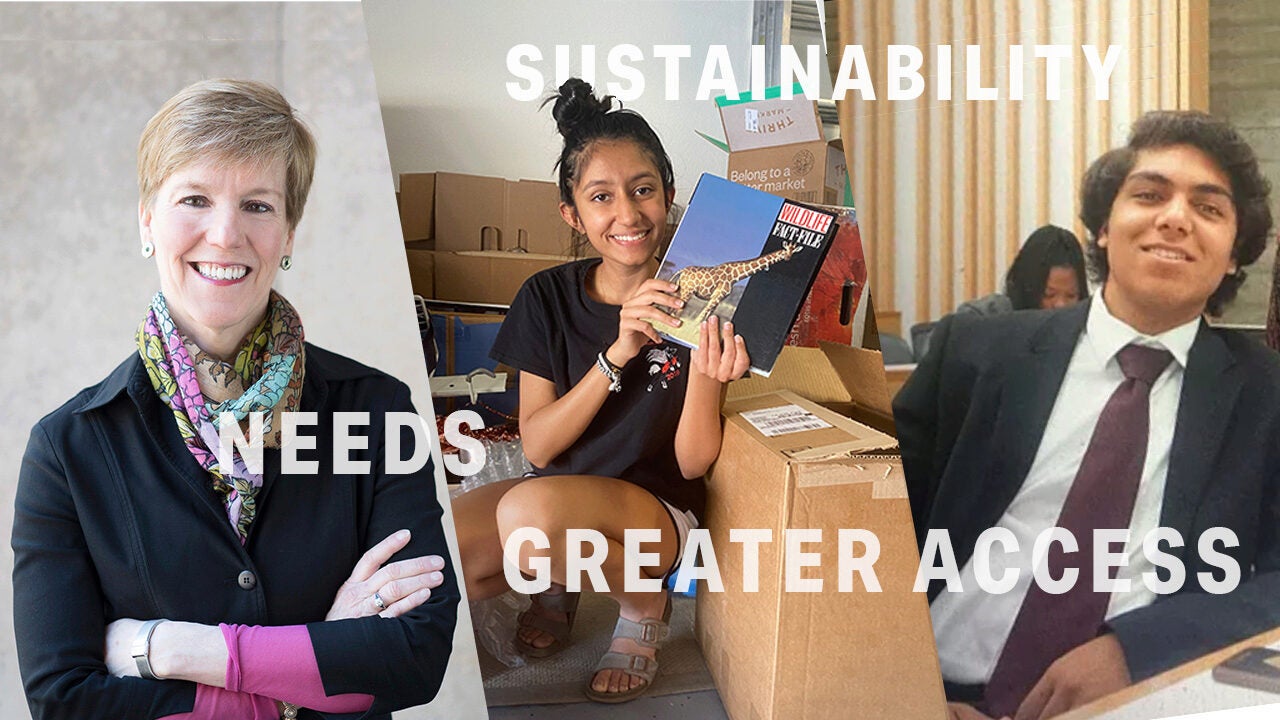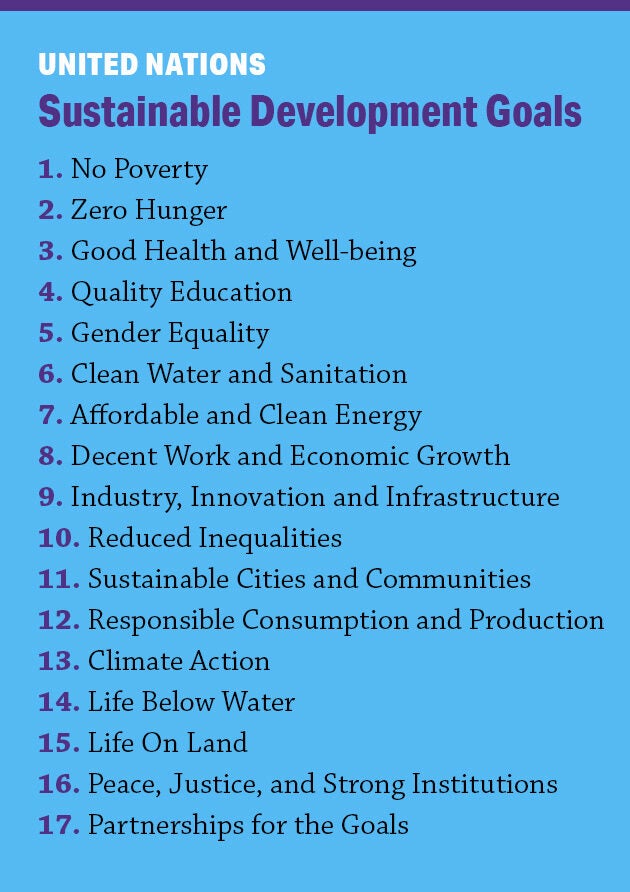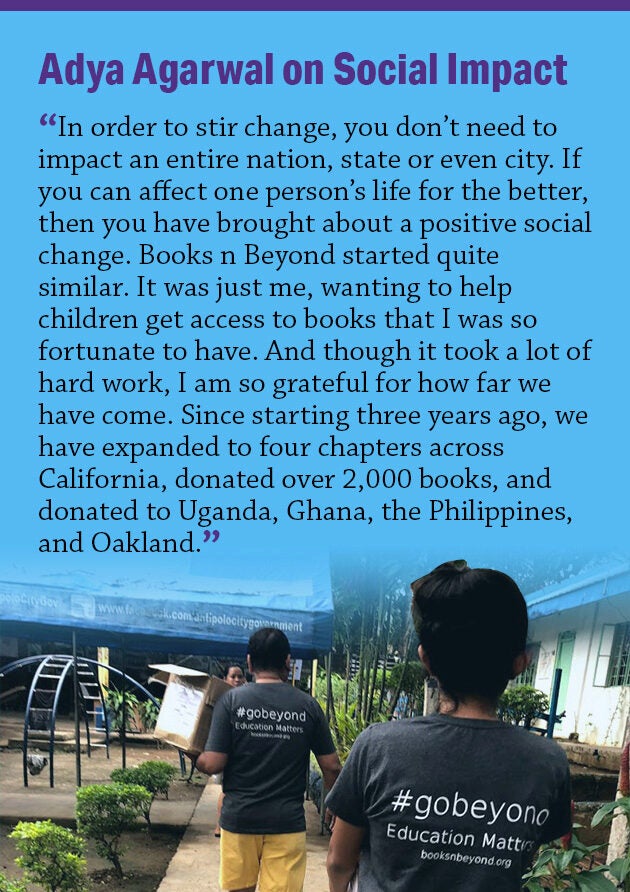The Conversation: Social Impact and Making a Difference in the World


The well-being of the community. This is where thinking about having a social impact begins. In the midst of a persistent global pandemic, social-impact projects have taken on even greater meaning, from addressing health concerns and economic challenges, to education access and small business struggles.
Ronit B., a high school junior in California, took one look around his community this spring and saw vulnerability. His favorite local restaurants were shutting down or going on life support due to COVID-19 restrictions that limited customers.
Soon after, he and some classmates started a nonprofit to help restaurant workers who have been laid off or sidelined during the economic downturn. Ronit says his organization has worked with more than 40 displaced restaurant employees to help them find jobs and even generate income by selling food from new locations. “I’ve come to realize that creating a social impact is so much more than simply raising and donating funds,” notes Ronit. “Creating a social impact is about empowering people and communities and making their livelihoods sustainable.”
Ronit further explored his social impact interests, as well as his passion for finance, marketing, politics and international business, this past summer during Wharton Global Youth Program’s Future of the Business World course. Outside of the business coursework, he and other high school students – including Adya A., founder of Books n Beyond – met weekly to discuss their non-profit organizations.
“Values matter a whole lot. If you’re interested in social impact, do a values check-in with yourself or your friends once a year. What are you passionate about? What do you want to learn about? What will stimulate you in your career?” — Katherine Klein, Vice Dean, Wharton Social Impact Initiative
As these students learned, the relationship between business and social impact has deepened in recent years, giving rise to new non-profit organizations, as well as for-profit businesses that want to make money, while also making the world a better place.
Katherine Klein, the vice dean of the Wharton Social Impact Initiative, spends most of her days studying and innovating at this intersection between business and social impact. The Social Impact Initiative, which cuts across all business areas of Wharton, is about “looking at how business and finance can contribute to making the world a better, more inclusive and sustainable place,” she says.
Klein recently discussed social impact with us, drilling down on four key questions about changing the world as a businessperson and the path you must take to make that happen:
Wharton Global Youth: What is social impact?
Katherine Klein: Some people argue that, ‘Hey, don’t all businesses have social impact?’ And they do. They have impact on the lives of the people they employ and their communities, and so on. We tend to define social impact as doing the greater good that goes beyond standard business practices. Particularly, we define social impact around using the framework from the United Nations: the Sustainable Development Goals. There are 17 SDGs, as they’re called. Many nations around the world have signed on to the SDGs with a goal of achieving these standards by 2030. For example, the first one is No Poverty.
The SDGs focus on three broad goals. One is basic needs. Do people in the U.S. and around the world have access to healthy food, clean water, safety, freedom from violence, crime and war, and a roof over their heads? Second, is providing real opportunities for people who don’t ordinarily have those opportunities — greater access. And the third is environmental sustainability. Anything that makes this world a healthier, more sustainable place for the planet. So, meeting basic needs; creating opportunities for those who don’t have them, often around education and jobs and inclusion; and improving the environment. When we talk about business social impact, we’re interested in businesses that are contributing in some way to those three goals.

Wharton Global Youth: We’ve talked in the past about impact investing and thinking about finance and social impact. How does the Wharton Social Impact Initiative teach in other areas of business outside of finance?
Klein: My social impact class for undergraduate students takes a deep-dive focus on two social issues every year. The two we have been doing are barriers to college access and completion, and the other is barriers to employment following incarceration. One of the things I love about this class is that I bring in expert speakers every class session. I’m bringing in research experts on these topics to talk about who applies to college? Do they know about financial aid? If they get into college, do they actually go? I bring in for-profit and non-profit leaders who are working in this space. What are the most innovative, interesting companies doing around education? What are the non-profit leaders doing about education? I do the same things around barriers to employment following incarceration. It’s so important to understand the social issues and really understand the research evidence on these topics, and then meet with leaders who are trying to make a difference in this space.
Wharton Global Youth: What does it mean when a company is described as having a triple bottom line?
Klein: The triple bottom line [has three components]. First, the company is performing well financially, which is the standard bottom line. The second bottom line is social performance and how the company treats employees. How does it engage in the community? And the third is the environmental performance: how does the company perform environmentally? A small company that is endeavoring to be strong on the triple bottom line was founded by [Gabriel Mandujano], a University of Pennsylvania and Wharton graduate, and is called Wash Cycle Laundry. This company tries to make money by doing laundry for commercial companies and U Penn hospitals and hotels. It washes that laundry and towels in a clean, non-polluting way. And it delivers in Philadelphia on bicycles. So, people on bicycles are coming around with these big baskets to pick up the laundry and return the laundry to customers. The people who Wash Cycle employs would be difficult to employ otherwise. They may have criminal records, or may have been unemployed for a long time or homeless. So, the social piece is: who are we hiring and supporting and creating jobs for? The environmental piece is: we’re using bicycles and stopping pollution. And the financial returns piece is: we want to make money doing that. That is an example of a small company that is very committed to the triple bottom line.
Wharton Global Youth: What advice do you have for students who want to pursue business and social impact?
Klein: Values matter a whole lot. If you’re interested in social impact, do a values check-in with yourself or your friends once a year. What are you passionate about? What do you want to learn about? What will make you feel proud of yourself? What will stimulate you in your career? Check to see if you’re living true to your values. As you think about college [and maybe want to study business], make sure that you are taking classes where you are learning about the social and environmental issues that really matter to you. If you care about making the oceans safer and cleaner, then take a lot of oceanography. One of the mistakes that I see is that there is an arrogance that can come with business. People think, ‘Well, If you only had a business mindset, of course you could solve that problem.’ Not true. These are not easy problems to solve. You need to understand the issues. If you’re really interested in gender and women’s rights, then make sure you learn about sexism and are taking gender-theory classes and are studying gender dynamics in countries around the world. That marriage of deep knowledge about a social or environmental issue and business is really good.

According to Professor Katherine Klein, the United Nations Sustainable Development Goals are a blueprint for social impact. Check out the list of 17 goals and click on the link in this article to better understand what each goal involves. Which goals and social issues would you keep on the list? What would you take away? What would you add?
What is Wash Cycle Laundry and how does it reflect a company with a triple bottom line?
Are you endeavoring to have a social impact, either by running a non-profit organization or for-profit business? Or maybe you have benefited from a social-impact initiative? What does social impact mean to you? Describe your experience in the comment section of this article.
Currently, only about 15% of water bottles are recycled. Each year, 28 billion bottles are consumed across the world. That leaves almost 24 billion water bottles to be dumped in landfills across the world. This creates a great deal of waste that puts enormous pressure on our planet’s environment.
How about cutting out bottled water altogether? That’s right cutting out bottled water will save the environment. Companies should embrace and promote eco-friendly products that are sustainable and thrive more towards environmentally friendly.